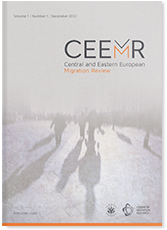Dimensions of Citizenship Policy in the Post-Yugoslav Space: Divergent Paths
Dimensions of Citizenship Policy in the Post-Yugoslav Space: Divergent Paths
Author(s): Jelena DžankićSubject(s): Civil Law, International relations/trade, Period(s) of Nation Building, Post-Communist Transformation, Inter-Ethnic Relations
Published by: Ośrodek Badań nad Migracjami / Uniwersytet Warszawski
Keywords: citizenship; nation building; statehood; former Yugoslavia;
Summary/Abstract: The break-up of the former Yugoslavia resulted in the establishment of seven states with manifestly different citizenship regimes. Relating the politics of citizenship to the dominant nation-building projects, this paper argues that in the post-Yugoslav countries in which nation-building projects are consolidated (Croatia, Slovenia and Serbia) citizenship regimes converge around ethnic inclusiveness, while in those where nation building is contested (Macedonia and Montenegro) territorial rather than ethnic attachments are articulated in citizenship policies. In the case of Kosovo, and to a certain degree Bosnia and Herzegovina, policies emphasise territory due to international involvement in the shaping of their citizenship regimes. Even though all of these states have adopted ius sanguinis as the main mechanism of citizenship attribution at birth, the different approaches to naturalisation and dual citizenship indicate that the politics of citizenship are inextricably linked to the questions of nation building and statehood. To explore these issues, the paper first outlines the main traits of citizenship policies in contested and consolidated states. It proceeds by looking at different naturalisation requirements in the two groups of states. It argues that extension to ethnic kin occurs only in countries in which statehood and nation building are consolidated, where it serves to project an image of national unity. In states that are challenged by several competing nation-building projects, citizenship attribution through ethnic kinship is impossible due to lack of internal unity. The paper also analyses approaches to dual citizen-ship, identifying patterns of openness and restrictiveness. By doing so, it links the politics of citizenship to the interaction of foreign policy mechanisms in post-Yugoslav countries and identifies the points where these regimes overlap or conflict with each other.
Journal: Central and Eastern European Migration Review
- Issue Year: 6/2017
- Issue No: 1
- Page Range: 31-48
- Page Count: 188
- Language: English

